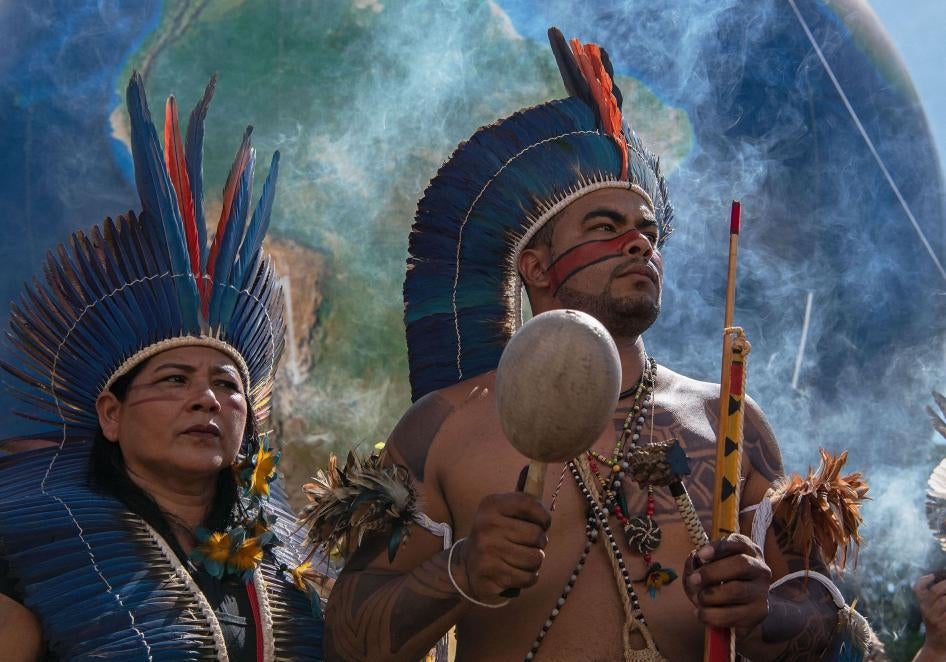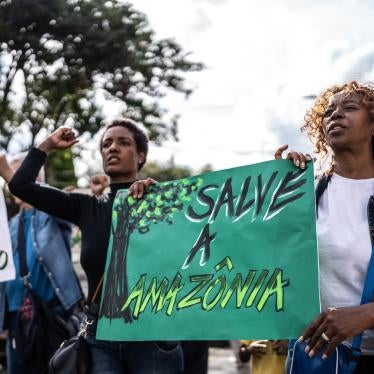(São Paulo) – Brazil should not impose an arbitrary cutoff date that curtails the land rights of Indigenous peoples, Human Rights Watch said today in a letter to Solicitor General Jorge Messias.
His office should immediately review a harmful legal opinion that Indigenous communities cannot obtain formal recognition of their lands if they were not physically present on them on October 5, 1988, the day Brazil’s Constitution was enacted, or if they had not initiated legal claims by that date.
“During the campaign and after being elected President Lula promised to defend Indigenous rights,” said Maria Laura Canineu, Brazil director at Human Rights Watch. “The Lula administration should deliver on that promise by rejecting, without delay, the harmful rule used by the Temer and Bolsonaro administrations to arbitrarily block land claims by many Indigenous people.”
Thousands of Indigenous peoples are preparing for an annual mobilization in Brasília between April 24 and 28, 2023, called Free Land Camp (“Acampamento Terra Livre” in Portuguese). As they gather in Brasilia, they will demand protection of their rights, including demarcation of their territories. This procedure sets out what land belongs to Indigenous peoples and provides them with secure collective legal rights over that land.
In 2017, during the administration of former President Michel Temer, the Solicitor General’s Office adopted a legal opinion that upheld the 1988 cutoff date. Using that date would make demarcation impossible for communities that were expelled from their territories before the 1988 constitution or that can’t prove that on that date they were there or were involved in a dispute over their claim. The administration of former President Jair Bolsonaro maintained that position and effectively suspended all pending demarcations of Indigenous lands, halting proceedings that had already been awaiting a decision for years.
Federal prosecutors have repeatedly warned that the former solicitor general’s opinion violates Brazil’s Constitution, and the Supreme Court is examining the legality of the cutoff date. The court suspended implementation of the legal opinion in 2020, pending its final ruling, which will apply to all cases.
The legal uncertainty over providing land titles makes Indigenous territories especially vulnerable to encroachment by criminal networks that engage in illegal mining, logging, and land-grabs, fueling conflicts and violence. Land seizures and other incursions to exploit natural resources on Indigenous lands increased 180 percent between 2018 and 2021, the nonprofit Indigenist Missionary Council reported.
As the new solicitor general, who was appointed by President Luiz Inácio Lula da Silva, reviews the positions taken by that office under the previous administrations, he should immediately send the Supreme Court an opinion rejecting the cutoff date and upholding Indigenous rights, as contemplated in Brazil’s Constitution and under international standards that Brazil supports, Human Rights Watch said.
Choosing an arbitrary cutoff date and refusing to recognize ancestral lands claimed after that date is not in line with international standards. The United Nations Declaration on the Rights of Indigenous Peoples, which Brazil supported, recognizes that Indigenous peoples have the right to the lands, territories, and resources that they have traditionally occupied or used. States are required to give legal recognition and protection to traditional lands, including those that Indigenous peoples were forced to leave or had otherwise lost. The Inter-American Court of Human Rights has also recognized that Indigenous peoples’ right to their traditional territory persists as long as “the material, cultural, or spiritual connection” with the land persists.
Not only is demarcation and protection of lands fundamental to upholding Indigenous rights, but it is also a cornerstone of successful conservation, Human Rights Watch said. Indigenous management effectively prevents deforestation, with Indigenous territories in Brazil and other Amazon countries registering lower deforestation rates in relation to comparable areas. Indigenous management also delivers net climate benefits for the planet, as forests managed by Indigenous people in the Amazon are strong net carbon sinks.
“Indigenous people endured four years of constant encroachment by loggers, miners, cattle ranchers, and others empowered by the Bolsonaro administration’s hostile rhetoric and actions toward Indigenous rights,” Canineu said. “The Lula administration should stand with Indigenous people and resume titling and protection of their lands, in line with the constitution.”









